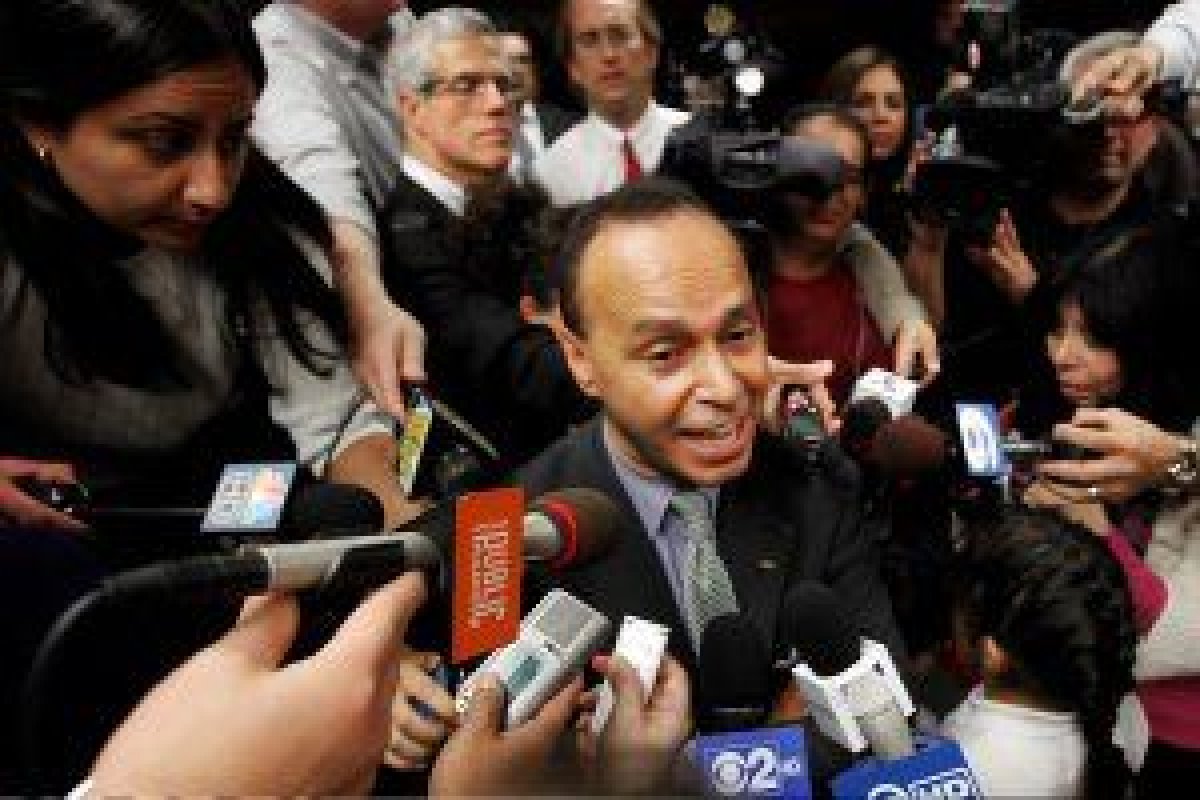
Once you've made a promise to U.S. Rep. Luis Gutierrez, it's a bad idea to break it. Because if you do, he'll call you on it, and then he'll broadcast your perfidy incessantly, with every megaphone he can get his hands on, to anyone who will listen. Just ask President Barack Obama, who failed to keep his word on tackling immigration reform in his first year in office. Though the two Chicago Democrats were once close, Gutierrez has spent much of the past two years badgering the president on the issue. "He was clear in his commitment to me," says Gutierrez. And yet "everything has been enforcement, enforcement, enforcement"—more deportations of undocumented immigrants, more troops |on the border. "How," asks Gutierrez, "is this different from what George W. Bush did?"
Gutierrez, 56, is the most passionate, tireless, and nettlesome voice in Congress on immigration matters. He's a constant presence at rallies and on TV, defending the undocumented and railing against xenophobia. It's no surprise that a recent Pew Hispanic Center survey ranked him the second-most-important Latino leader in the country, after Supreme Court Justice Sonia Sotomayor. "He's as close as the Latino community has to a Martin Luther King figure," says Frank Sharry, founder of the pro-immigrant group America's Voice. Yet Gutierrez's tactics are controversial. While many admire his tenacity and credit him with keeping immigration reform alive, others, including members of the Obama administration, believe his confrontational style can be counterproductive. He sees things more simply. "I have only one loyalty," he says, "and that's to the immigrant community."

Gutierrez has now embarked on his latest campaign: to secure quick passage of the DREAM Act, which would legalize undocumented youths who attend college or serve in the military. With a Republican takeover of the House imminent, the lame-duck session of Congress offers the last chance (for a while, at least) to get it done. It won't be easy, given the noxious atmosphere in Washington. Yet Gutierrez has already launched a nationwide tour of churches to rally immigrants and their supporters, and has begun rounding up votes in the House. Two weeks ago, he and a few other lawmakers met with Obama at the White House. "We want you to put everything you can behind this," he says they told the president. Obama agreed to help—by, among other things, placing personal calls to wavering lawmakers.
Gutierrez's first stop on his church tour was St. Brigid's in Brooklyn a week ago. Joined by Rep. Nydia Velázquez, chair of the Congressional Hispanic Caucus, and other elected officials, he was received with adulation by the hundreds of people packed in the pews. His speeches at events like these—delivered in a stentorian voice, despite his slight physique—resemble revivalist sermons. He started off softly, then crescendoed to ear-splitting decibels, jabbing his index finger toward the heavens. "The other side is waiting for us to get tired!" Gutierrez thundered in Spanish. "Is anyone here tired?" "No!" the audience roared back.
The son of Puerto Rican parents, Gutierrez has long had a fiery streak. He was a student leader and community organizer before entering politics, first as an alderman and then a congressman representing a majority-Latino district. Though he's about to start his 10th term, Gutierrez's activist roots still show. Within weeks of Obama's taking office, he set off on a 30-city tour to highlight the stories of families split apart by deportations and to pressure the administration to take on immigration reform. One year later, with things at a standstill, Gutierrez turned more adversarial. He said Hispanics were becoming angry and disillusioned, and were losing patience with the president. In May of this year, he was arrested at an immigration protest in front of the White House. The following month, he threatened to urge Latinos to sit out the midterm elections if Democrats didn't act on immigration reform. "In any movement, you need agitators," says Simon Rosenberg, president of the New Democrat Network, which has pushed for reform. "I frankly admire him for having the courage to take on friends and allies."
That sentiment isn't shared by many in the administration. Gutierrez clashed repeatedly with Rahm Emanuel, Obama's former chief of staff, whom he considered a prime impediment to an immigration overhaul. Another administration official, who didn't want to be named to avoid exacerbating tensions, complains that Gutierrez "has contributed to the flawed impression that the president can do this by himself"—when, in fact, he depends on Congress to move legislation. "It saddens me … that [the president] and I have had these very public differences," says Gutierrez.
It's quite a turnaround for the two men. When Obama was a freshman U.S. senator, he used to call Gutierrez regularly for advice. When he decided to run for president, he sought Gutierrez's endorsement early on—and got it. "There was a time when I was the only elected Latino that was for him. They were all for Hillary [Clinton]," says Gutierrez. "I love him. I want him to do well … But I have to be true to what I believe in." (Cecilia Muñoz, a White House point person on immigration, calls Gutierrez "an important moral voice" and says that he and the president "are on the same side of the issue.")
Outside the administration, some backers of immigration reform also have misgivings about Gutierrez's approach. He "transformed what had been a narrow policy issue into a litmus-test identity issue for Hispanics, and that made the debate a whole different ball game," says Tamar Jacoby, president of ImmigrationWorks USA, a coalition of business groups that rely on immigrant labor. Gutierrez is "incredibly effective at what he does … [But] there's part of me that always gets a little worried about identity politics."
Still, Gutierrez has a track record of pragmatism, too. He took flak from some advocates for including strict enforcement provisions in an immigration bill he crafted with Republican Rep. Jeff Flake in 2007 (it didn't pass). "He can go from being a bomb thrower to being a dealmaker," says Angela Kelley of the Center for American Progress. "That's a pretty important bilingual ability." Gutierrez's promotion of the DREAM Act is itself a compromise. Pro-immigrant forces agonized over whether to abandon the fight for a comprehensive bill in favor of a narrower one that would benefit only a slice of the undocumented population. In the end, they concluded that only the DREAM Act had a real chance.
Gutierrez thinks the measure can prevail in the House. The bigger challenge is in the Senate, where Majority Leader Harry Reid has pledged to bring the bill to the floor in the next few weeks. Given the need for 60 votes to break a filibuster and the likely defection of a handful of Democrats, the measure's backers need to win over at least a half dozen Republicans—a tall order these days. But seven current Senate GOP members voted for the DREAM Act in 2007, and a few others who are retiring aren't considered hardliners.
The immigrant movement will face a much more adverse climate in Congress next year. As a result, Gutierrez is trying to redirect its energy toward a different end: persuading Obama to use his executive powers to stop the deportation of law-abiding illegal immigrants. To ratchet up the pressure, Gutierrez is encouraging acts of nonviolent civil disobedience. "We cannot be a slave to the legislative process," he says. "That's what we've done, and it hasn't served us very well." Given that some Republican lawmakers have made clear they plan to use their newfound power to crack down even more on illegal immigrants, "the next couple of years are going to be an extraordinary battle," says Rosenberg. Gutierrez's "voice will be needed more than ever." And you can be certain you'll hear it.
Uncommon Knowledge
Newsweek is committed to challenging conventional wisdom and finding connections in the search for common ground.
Newsweek is committed to challenging conventional wisdom and finding connections in the search for common ground.
About the writer
To read how Newsweek uses AI as a newsroom tool, Click here.








